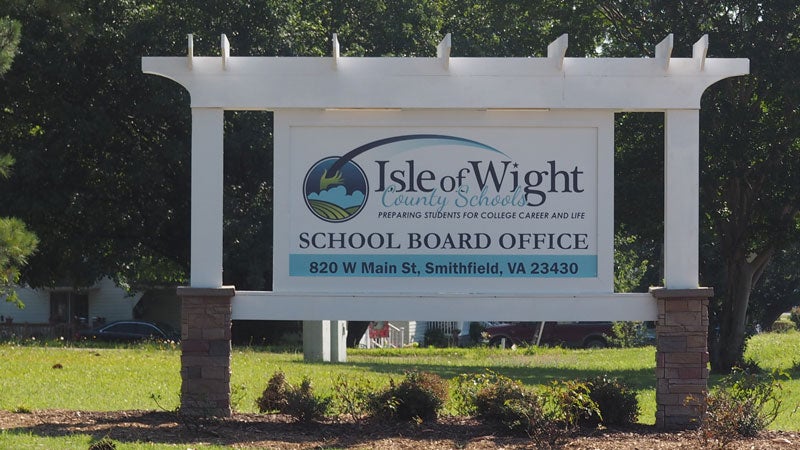Isle of Wight School Board bans ‘sexually explicit’ content in elementary, middle schools
Published 5:39 pm Friday, February 10, 2023

- File photo
Vote on policy that would ban teaching on ‘systemic racism’ set for March
The Isle of Wight County School Board voted 3-2 on Feb. 9 to prohibit elementary and middle school students’ access to “sexually explicit” materials.
In December, newly elected School Board member Mark Wooster proposed what he termed a “more comprehensive” version of a state-mandated policy intended to allow parents to opt their children out of explicit materials.
The Virginia General Assembly passed legislation in 2022 requiring school boards to adopt policies by Jan. 1 that are “consistent with” or “more comprehensive than” new Virginia Department of Education model policies, which require schools to provide parents at least 30 days’ notice of using any explicit materials. The law defines “sexually explicit” to mean any “lewd exhibition of nudity,” or any image or description of “sexual excitement, sexual conduct, sadomasochistic abuse, coprophilia, urophilia, bestiality or fetishism.”
The School Board had voted in November, before Wooster took office, to incorporate the model policy language into an existing policy designated IIA. The latest version of IIA adopted on Thursday goes beyond parental notification and states the school system now “restricts the use of sexually explicit materials” for preschool through eighth grade.
An earlier draft of Wooster’s Policy IIA changes, which went before the School Board for a first reading in January, had included a prohibition not only on “sexually explicit” materials but also any curriculum component deemed “inherently divisive.” After the draft drew fierce opposition from students and teachers who condemned the move as censorship, Wooster and newly elected board member Jason Maresh agreed to strike the “inherently divisive” language from the Policy IIA draft and instead modify Policy INB, which deals with teaching controversial issues.
The draft Policy INB changes, which went to the School Board for a first reading on Thursday, would mandate teachers “not indoctrinate” students with “the belief that the United States, or any governmental entity within the nation, perpetuates systemic racism.”
The change, however, didn’t reassure Smithfield High School history and government teacher Matthew Ployd, who contended it would result in “a very whitewashed version of history and English” that “the authors of this amendment seem to desire from our schools.”
“Who decides or determines what’s indoctrination?” Ployd asked.
Matt Burgess, who teaches government and history courses at Windsor High School, contended the Policy INB changes would “name teachers as the enemy.”
“I am not a Marxist, I am not a fascist, I am not a groomer, I do not teach Critical Race Theory,” Burgess said, referring to the college-level legal theory, often abbreviated CRT, which argues American laws and institutions have perpetuated inequalities among minorities.
The two educators were among the 11 speakers during the meeting’s nearly 45-minute public comment period on agenda items, eight of whom spoke in opposition to the proposed Policy INB changes. Laura Fletcher, who described herself as being a “mother of white children,” was among the other three speakers who urged the board to stay the course on policies IIA and INB.
“Mr. Maresh, Mr. Wooster, thank you for the courage you’ve shown in … protecting our children from the mire of worldly perversions barreling down on them long before their hearts and minds are ready to carry these burdens,” Fletcher said.
Wooster and Maresh, who each won their seats in November, had campaigned on platforms of opposition to “divisive” and “sexually explicit” materials. In 2021, Maresh and other parents took specific issue with Smithfield High School’s “Read Woke” challenge, which encouraged students to read social justice-themed books available at the school’s library.
Maresh, in a 2021 letter, contended the books “disparage white people as privileged, inherently racist, oppressors.” Other parents had argued the books use of profanity and depictions of sex and rape were inappropriate for teenagers. The Read Woke challenge at Smithfield High has since ended, though the books remain available.
The adopted version of Policy IIA retains language added in November requiring the school system to maintain a list of instructional materials with sexually explicit content by grade and subject on its website. The list is available via a linked spreadsheet.
To date, the only book added to the list is George Orwell’s dystopian novel “1984,” which is taught in grades 9-12 advanced-placement and dual-enrollment English courses.
The adopted version of Policy IIA states dual-enrollment courses are “exempt” from the policy’s restrictions since their content is controlled by the associated college offering the course, but doesn’t state the same for advanced-placement courses.
Under the policy, parents may still request to view a course syllabus before enrolling their student in a dual-enrollment course, but “alternative assignments will not be provided.”
DE and AP courses each offer high school students the opportunity to earn college credits. With AP courses, the college credit is contingent on a student taking and passing an end-of-semester standardized exam created by the College Board.
The College Board, which functions as the nationwide overseeing organization for AP courses, has stated on its website that if schools censor required topics from their AP courses, the board will remove the AP designation from the course and its inclusion in the AP course ledger provided to colleges and universities. Students and teachers had argued in January that this could jeopardize students’ acceptance to colleges and any scholarships awarded.
Wooster, Maresh and Board Chairman John Collick cast the three votes for the Policy IIA changes. Board members Denise Tynes and Michael Cunningham made no statements prior to casting their dissenting votes, but had each spoken in opposition to the Policy IIA changes at previous meetings.
Tynes, in January, contended the November version of Policy IIA had already allowed parents the option of reviewing and opting their children out of any content they find objectionable, without censoring the material for all students. Cunningham, in January, argued there are already filters installed on school-issued iPads and other electronic devices, which are designed to filter content by age-appropriateness.
Tynes and Cunningham likewise objected to the proposed changes to Policy INB.
Maresh, however, pledged to “press forward with the spirit and intent of this policy” despite the pushback from teachers.
Maresh then equated the proposed restrictions on teaching controversial issues with an existing policy prohibiting teachers from using or distributing illegal drugs.
“I’m confident sitting up here saying we don’t have a teacher in Isle of Wight County Schools making drugs or selling them in the schools, but we’ve still got a policy. … If you’re not trying to promote, instruct or advance an idea of anything that may be perceived as controversial, then this is a non-issue,” Maresh said.
The proposed changes to Policy INB will go for a second reading and will likely be voted upon at the board’s March 9 meeting.




